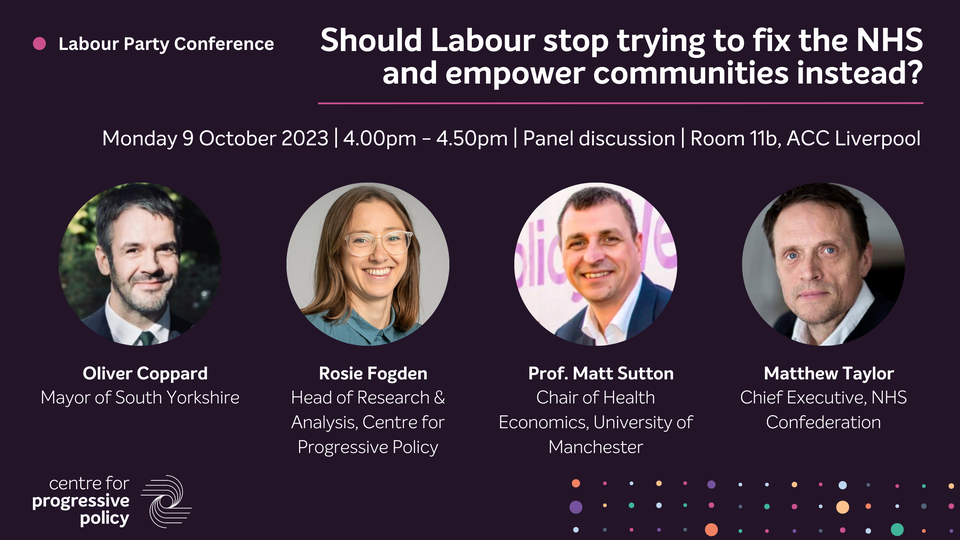Labour Party Conference: Should Labour stop trying to fix the NHS and empower communities instead?
Panel discussion in partnership with the New Statesman
9 October 2023
4:00–4:50pm
Room 11b, ACC Liverpool (secure zone)
At 2023’s party conferences the Centre for Progressive Policy hosted a range of panel discussions with prominent speakers exploring health care, devolution, and the reality of investing in and delivering fair growth for people and places throughout the UK.
You can find more information about the event and speakers below, and visit our photo gallery.
About the event
In recent years, both major political parties have devoted their energies to making incremental improvements to health and care provision in the UK. While these changes are undoubtedly lifesaving for many people, is now the time to be more ambitious? Could a devolved approach to population health revolutionise prevention, provision and access across the UK?
At present, people in England are losing 1.5 years of life and 2.6 years of good health, on average, as a result of socioeconomic inequalities in employment, income, education, crime and housing. We therefore cannot hope to build a healthier, more productive society without strengthening the public services that support better outcomes in these areas. It is also vital that we embed health reforms within wider policy and governance structures that tackle deep-rooted inequalities. Labour has committed to a cross-government approach to take this agenda forward, but could devolution bolster these efforts further?
Greater Manchester is the most prominent model of devolved health and care in England, with the Combined Authority distributing £6bn across a coalition of public agencies that operate within ten boroughs. Devolution in Greater Manchester has allowed for greater investment in prevention and social factors shaping health, stronger collective decision making by NHS agencies and local government and closer coordination of services across local areas. We are already seeing the beginnings of positive trends for health and care in Greater Manchester, with improvements in key areas including babies’ health, children’s development, smoking cessation and referrals for cancer treatment. The devolved approach to health and care provision also allows for better long-term planning: Greater Manchester is part-way through a five-year plan aimed at helping people to better manage their own health; provide more joined-up, local care; increase efficiency and standards and share skills and treatment across hospitals and practices.
What lessons can we draw from the Greater Manchester example, particularly with regard to public services? And how can a whole-system approach revolutionise health and care provision in the UK?
This panel discussion covered questions including:
- What lessons can we learn from seven years of health and social care integration in Greater Manchester, and how is South Yorkshire approaching this?
- Should Labour spend less on the NHS and give more resources to Mayors to improve the health of their local populations?
- What are the opportunities and challenges for NHS hospitals within new integrated health and care approaches?
- What further economic levers on health and social care do places need to be successful in improving the health of their populations?
- How can Labour foster an enabling environment to support places to improve health outside of healthcare?
- How can a Labour government strike the right balance between prevention and dealing with acute pressures?
Chaired by Zoë Grunewald, Political Reporter at the New Statesman.
This event is took place in partnership with the New Statesman.

Speakers

Oliver Coppard
Mayor of South Yorkshire
Born and raised in the region, he took office as Mayor in May 2022, elected on a platform of restoring the pride, purpose and prosperity of South Yorkshire. After graduating from Leeds University, Oliver began his career at Barnsley Council working on low carbon regeneration projects. Since then, he’s worked in Parliament, in the US Congress and with the charity BookTrust. He was recently Chair of the Board at Sheffield Hallam Students’ Union and has worked a number of high-profile political campaigns, both within the region and abroad. Since taking office, Oliver has started work delivering his manifesto pledges, building on his promise to do politics differently, and to fight for a better deal for South Yorkshire.

Rosie Fogden
Head of Research & Analysis, Centre for Progressive Policy
Rosie joined CPP in 2019 as a Senior Research Analyst and now manages our research programme. She has written on the importance of long-term investment in public services and the role of business in making our economy more inclusive, including through good jobs. Before CPP, Rosie worked as a Senior Economist in the Cabinet Office, supporting Brexit preparations. She has also held several other government positions, including in the international group at HM Treasury.

Professor Matt Sutton
Chair of Health Economics, University of Manchester
Matt obtained a first class honours degree in Economics with Econometrics from the University of Leeds in 1990 and an MSc in Health Economics from the University of York in 1991. He joined the Centre for Health Economics at the University of York as a Research Fellow in 1991. After time working in Australia and Sweden, he returned to the Centre for Health Economics at the University of York in 1996 as a Research Fellow in the new National Primary Care Research and Development Centre. In 1999 he left York to take up a secondment at the Scottish Executive as an Economic Adviser where he worked on the 'Arbuthnott' resource allocation formula and inequalities in health.
In 2000 he was appointed Senior Research Fellow in the Department of General Practice & Primary Care at the University of Glasgow where he led a programme of research using linked survey, population and NHS administrative data. He simultaneously held a part-time appointment in the Information Services Division of NHS National Services Scotland.
He was appointed Professor of Health Economics by the University of Aberdeen in 2004 and was Director of the Behaviour, Performance and Organisation of Care Programme in the Health Economics Research Unit. He joined The University of Manchester as Professor of Health Economics in April 2008.

Matthew Taylor
Chief Executive of NHS Confederation
Matthew is a high-profile public figure who has had a distinguished career at the heart of public policy for the last 20 years. He has led the RSA for 15 years and during that time he transformed the organisation into a global institution, with 30,000 fellows and a high-profile and influential research programme.
Before that he was Chief Adviser on Political Strategy to Prime Minister Tony Blair, and he also ran the Institute for Public Policy Research (IPPR) for four years. He is a widely known commentator on policy, politics and public service reform and regularly appears on national media programmes, including as a panellist on BBC Radio 4’s Moral Maze. He was also commissioned by the Conservative Government in 2016 to carry out an independent review into modern employment practices. Matthew started his career as a health policy researcher in the West Midlands.

Zoë Grunewald (Chair)
Political Reporter, New Statesman
Zoe Grunewald is a journalist writing on politics and government policy for the New Statesman and its policy-focused online and print supplement, Spotlight. She also writes and curates the New Statesman’s Morning Call newsletter, which covers Westminster’s news of the day. She was formerly a senior policy adviser at the Department for Digital, Culture, Media and Sport, and prior to that worked as a parliamentary clerk in the House of Commons, including on the Science and Technology Committee, the Joint Committee on Human Rights and the Defence Committee, as well as in the procedural and legislative offices.